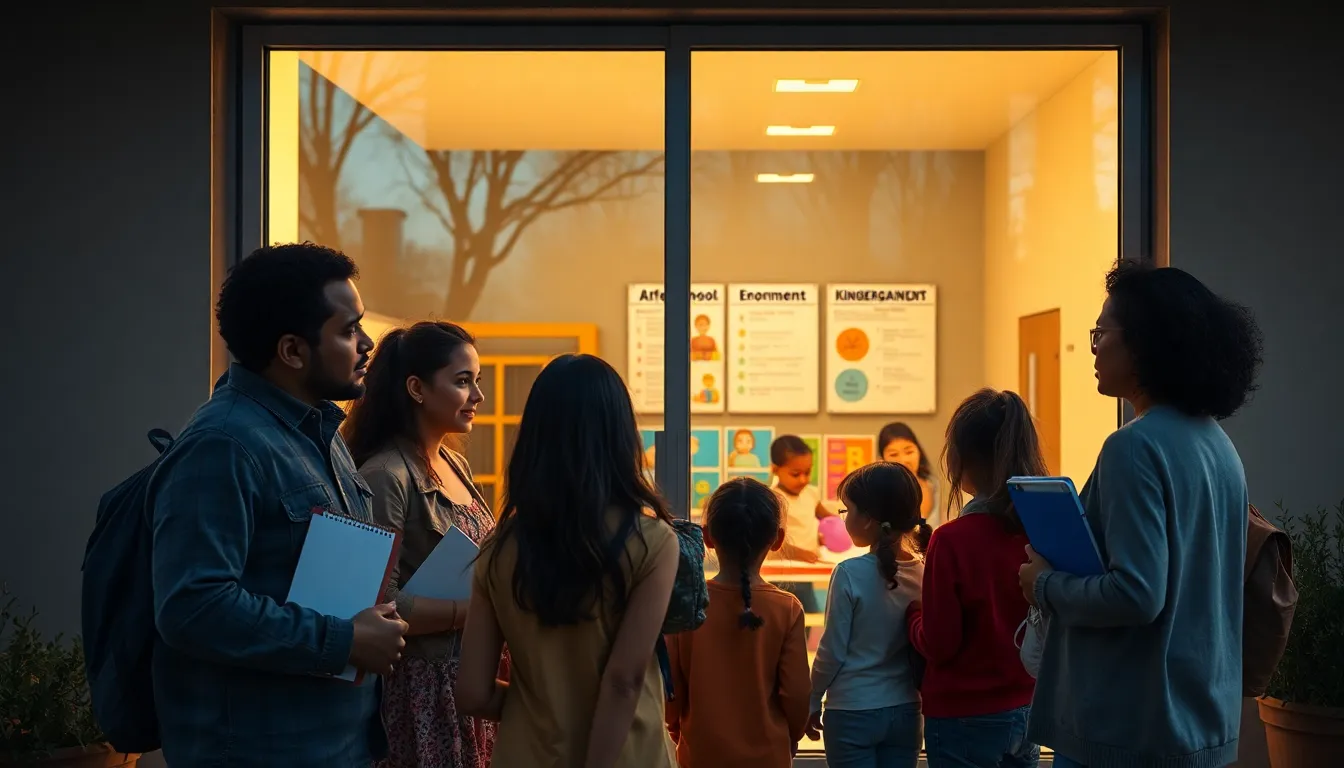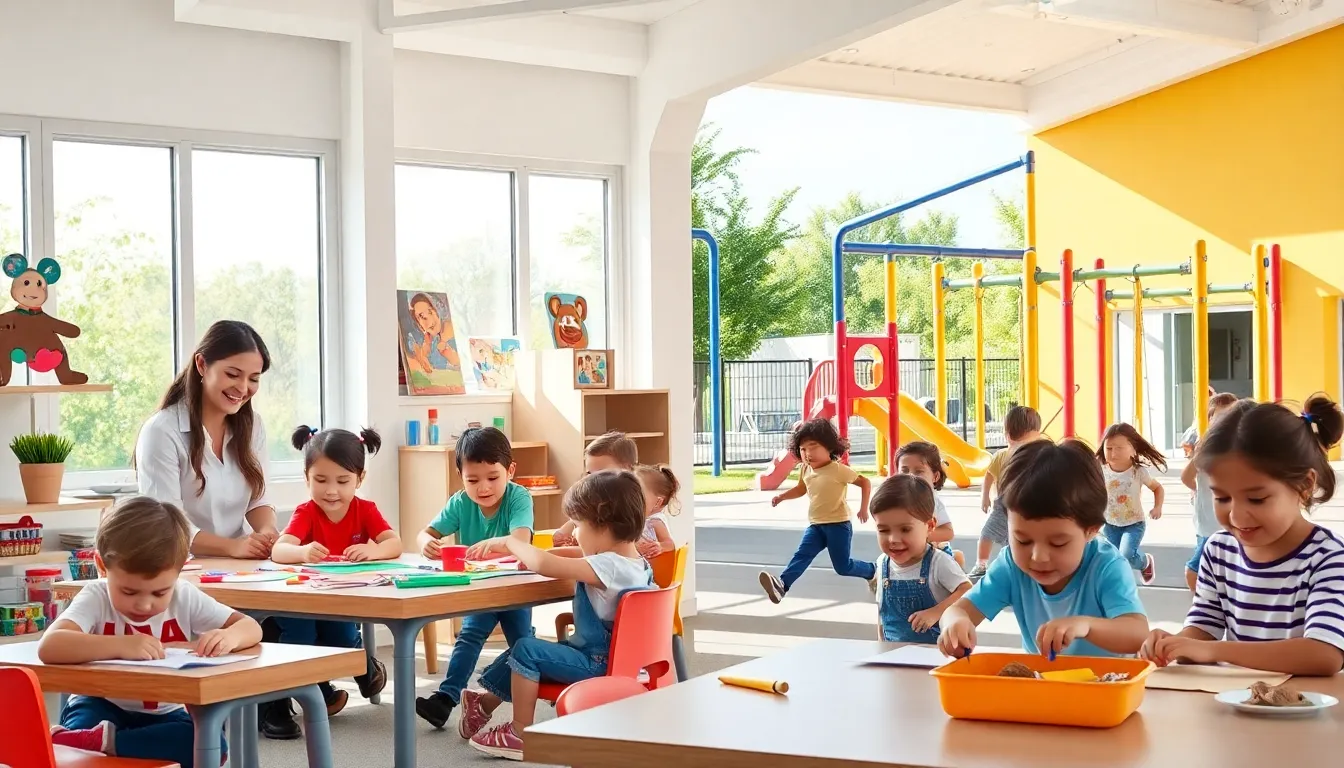The demand for Before and After School Care for Kindergartners has become a critical lifeline for modern working families, bridging the essential gap between the school day and the workday. These vital programs are not merely supplementary but a fundamental component, widely relied upon to ensure children’s safety, engagement, and continued development.
Key Implications
- Workforce Reliance: Before and After School Care for Kindergartners is crucial for enabling parental workforce participation, as 92% of utilizing parents are employed full-time, addressing the gap between school and work schedules.
- Parental Priorities: Safety is overwhelmingly rated as “extremely important” by 95% of parents, closely followed by program quality and curriculum, which 88% consider highly important when selecting care.
- Significant Accessibility and Cost Challenges: A substantial 70% of parents report difficulty finding available spots, and 62% identify affordability as a major barrier, with weekly costs averaging $180 to $290.
- Holistic Child Development: Programs contribute to well-rounded growth through offerings like homework assistance (60%), daily outdoor physical activity (90%), creative arts (70%), and educational enrichment (40%).

Demand for Kindergarten Care: A Lifeline for Working Families
The transition to kindergarten marks a significant milestone for children and families. While it signals a new chapter of learning, it also presents a complex challenge for many working parents. The reality is that the school day often concludes long before the workday, creating a critical gap. This is where comprehensive extended care programs become indispensable. These services provide essential supervision and support, ensuring children are safe and engaged during the hours before and after traditional school schedules. They are not merely an add-on but a fundamental component of the modern family’s support system.
Current data underscores the widespread reliance on these vital programs across the United States. A significant majority of young learners depend on such services to bridge the gap between school and home. This growing demand highlights the evolving needs of families navigating demanding professional lives alongside their commitment to early childhood development, making reliable Before and After School Care for Kindergartners a non-negotiable.
The Indispensable Role of Extended Care Programs
Extended care programs have firmly established themselves as a cornerstone of family support. Statistics reveal that 68% of kindergartners in the United States participate in some form of before and after school care. This substantial figure demonstrates how deeply these programs are integrated into the daily routines of countless families nationwide. Parents rely on these structured environments to ensure their children receive continuous supervision and engaging activities.
The type of kindergarten program also heavily influences participation rates. Children enrolled in full-day kindergarten programs utilize extended care at a higher rate, with 75% of them relying on these services. This compares to 55% of children in half-day programs. Even with a longer school day, full-day kindergarten still leaves substantial time gaps before and after school hours. This disparity highlights the differing needs based on school structure, yet both demonstrate a clear reliance on external support for safe childcare.
The design of these programs often includes opportunities for homework assistance, creative play, and social interaction. This holistic approach ensures that children are not just supervised but also continue to learn and develop outside the classroom. Reliable Before and After School Care for Kindergartners offers parents the peace of mind required to focus on their professional responsibilities.
Enabling a Full-Time Workforce
The economic imperative driving the demand for extended kindergarten care is undeniable. A striking 92% of parents utilizing these services are employed full-time. This statistic paints a clear picture: robust before and after school programs are crucial enablers for parents to maintain their careers and contribute fully to the workforce. Without these vital services, many families would face impossible choices between professional advancement and ensuring adequate care for their young children.
For working parents, the availability of dependable childcare directly impacts their ability to sustain employment, reduce absenteeism, and avoid career disruptions. The financial implications are profound, as childcare costs can often rival or even exceed college tuition in some regions, creating immense pressure on household budgets. Understanding these significant financial burdens of childcare underscores the necessity of accessible and affordable extended care options.
Moreover, the role of employers and government initiatives in supporting these programs is gaining recognition. Some cities and states are actively seeking ways to alleviate this burden for their essential workers. For instance, programs that help pay the majority of first responders’ childcare costs demonstrate a commitment to supporting critical community services. Similarly, initiatives in places like Oklahoma where schools offer free child care to retain teachers highlight creative solutions to systemic challenges.
Holistic Development and Parental Peace of Mind
Beyond simply covering time gaps, quality before and after school care for kindergartners contributes significantly to a child’s holistic development. These programs offer a structured yet relaxed environment where children can engage in various activities, from arts and crafts to outdoor play. Such settings foster social skills, emotional regulation, and a sense of community among young participants. They provide a vital space for children to unwind, explore interests, and build friendships after a day of academic learning.
The consistent routine and supportive staff found in these programs offer children a sense of security and belonging. This stability is incredibly beneficial during the foundational years of kindergarten. Parents, in turn, gain invaluable peace of mind, knowing their child is in a safe, stimulating, and supervised environment until they can be picked up. This allows parents to meet their work obligations without constant worry, ultimately reducing family stress and promoting overall well-being.
The continued growth and evolution of extended care options are vital for supporting the dynamic needs of contemporary families. These programs serve as an essential bridge, ensuring that children receive consistent care while empowering parents to thrive in their professional lives. The demand for reliable and high-quality Before and After School Care for Kindergartners will only continue to rise as families seek integrated solutions for their childcare needs.

Balancing Priorities: Safety, Quality, and the Cost of Care
When parents consider options for before and after school care for kindergartners, their decision-making process is deeply rooted in a set of critical priorities. While the financial investment in extended care is undeniably substantial, families consistently emphasize the fundamental aspects of a program. A remarkable 95% of parents rate safety as “extremely important” when selecting care, underscoring its non-negotiable status. This highlights the profound need for environments where young children are protected, securely supervised, and free from harm throughout their time outside regular school hours.
Following closely, 88% of parents place significant importance on program quality and curriculum. This extends beyond basic supervision to encompass rich, engaging activities that support a kindergartner’s holistic development. Parents seek programs offering educational enrichment, creative outlets, social skill-building opportunities, and age-appropriate play. A high-quality curriculum ensures that children remain stimulated and continue learning, making their extended day both fun and beneficial.
Despite the unwavering focus on safety and quality, the practical reality of extended care costs represents a significant hurdle for many families. Providing reliable before and after school care for kindergartners entails a substantial financial commitment. Nationally, the average weekly cost for these programs spans a considerable range, from $180 to $290. This figure alone illustrates the burden on household budgets, often rivaling or exceeding other major expenses.
The specific cost to families largely depends on the type of care provider. School-based programs, often integrated within the elementary school setting, typically present the most affordable option, averaging around $180 per week. Conversely, private care centers, which may offer specialized facilities or unique educational philosophies, tend to be pricier, with an average weekly cost of $250. Community-based organizations often fall in between, charging approximately $220 per week. For many, these child care costs rivaling college tuition, demanding careful financial planning.
Beyond the direct financial outlay, the sheer accessibility of suitable care programs poses another formidable challenge. A concerning 70% of parents report significant difficulties finding available open spots for their children. This scarcity is a widespread issue, leading to long waitlists and limited choices, especially in densely populated areas or for specific age groups like kindergartners. The stress of securing a reliable spot can be immense, impacting parents’ work schedules and overall family stability.
Compounding the problem of limited availability is the persistent issue of affordability. An alarming 62% of parents identify affordability as a major barrier to accessing the care they need. Even when a program meets safety and quality standards and has an open spot, the weekly cost can be simply out of reach for many household budgets. This often forces parents to make difficult trade-offs, sometimes leading to reduced work hours or reliance on less formal, potentially less structured care arrangements. Addressing this challenge is paramount, as demonstrated by innovative programs addressing childcare costs for teachers.
The repercussions of these widespread challenges are far-reaching, affecting not just individual families but also the broader community and workforce. When parents cannot find or afford suitable care, it can hinder their ability to maintain employment, particularly for mothers who often bear the brunt of childcare responsibilities. This societal impact underscores the need for greater support systems and policy initiatives to alleviate the burden. Some communities are exploring solutions, such as programs supporting first responders with childcare, acknowledging the critical role these services play.
Ultimately, the journey to secure the right extended care for kindergartners is defined by a tension between aspirational priorities and pragmatic realities. While the desire for safe, high-quality environments is universal, the economic and logistical barriers remain formidable for many. Recognizing and addressing these persistent issues of availability and affordability is essential to ensure that every child has access to the enriching, secure before and after school care for kindergartners they deserve, and that parents can participate fully in the workforce with peace of mind.

Beyond Childminding: Enriching Activities for Young Learners
For many families, the transition into kindergarten marks a significant milestone. While the school day provides foundational learning, the hours before and after can be equally pivotal in a child’s holistic development. Quality extended care programs for Before and After School Care for Kindergartners offer much more than just supervision. These carefully designed environments provide a balanced approach, integrating structured learning support, creative arts, abundant outdoor play, and targeted educational enrichment.
Such programs aim to foster a kindergarten child’s growth across all domains. They recognize that young learners thrive when given diverse opportunities to engage their minds and bodies. The focus shifts from simply managing time to actively promoting well-being and continued learning outside of regular school hours. This comprehensive approach ensures children are not just cared for, but genuinely nurtured.
Cultivating Academic Foundations and Support
A significant benefit of modern extended care is the inclusion of structured learning support. For many kindergartners, this means gentle guidance with emerging academic skills or a dedicated space for quiet activities. Data shows that 60% of programs offer a structured schedule with homework assistance. This feature is highly valued by parents, with a remarkable 72% indicating it is a desired component for their child’s extended care experience.
Providing homework assistance for kindergartners doesn’t involve intensive tutoring. Instead, it focuses on establishing good habits and offering support as they navigate new academic challenges. This could include help with recognizing letters, practicing numbers, or completing simple reading tasks. Programs often provide a calm, dedicated area where children can engage in these activities with staff available for gentle encouragement and clarification.
Such structured time can reinforce lessons learned during the school day, preventing academic gaps from forming. It also instills a sense of routine and responsibility, preparing young learners for future academic demands. By offering this support, Before and After School Care for Kindergartners actively contributes to a child’s early educational journey, making the learning process feel less daunting and more integrated.
Nurturing Creativity and Active Lifestyles
Beyond academic support, high-quality extended care places a strong emphasis on fostering creativity and ensuring ample physical activity. It is crucial for kindergartners to balance structured learning with opportunities for free expression and energetic play. These elements are not just fun; they are fundamental to healthy development.
The importance of physical activity is widely recognized. Across programs, 90% include daily outdoor physical activity. This allows children to release energy, develop gross motor skills, improve coordination, and engage in vital social play. Whether through organized games, playground time, or free exploration, outdoor play supports physical health and contributes positively to mood and concentration.
Equally vital is creative expression. 70% of programs incorporate creative arts and crafts daily. Activities like painting, drawing, sculpting with clay, music, and dramatic play encourage imagination, fine motor skill development, and self-expression. These creative outlets provide a space for children to process their experiences, develop problem-solving skills, and build confidence in their unique abilities. Many programs, like those highlighted by early childhood champions, prioritize these enriching experiences.
Holistic Development Through Educational Enrichment
The hallmark of an exceptional extended care program is its commitment to broad educational enrichment. These activities go beyond traditional school curriculum, introducing kindergartners to new concepts and skills in engaging ways. Such enrichment is designed to foster a well-rounded individual, sparking curiosity and a lifelong love for learning.
A significant portion of programs recognize this need, with 40% integrating educational enrichment activities for at least 30 minutes daily. This dedicated time might involve science experiments, basic coding games, cultural studies, or language exposure. For instance, some forward-thinking centers, such as the Kiddy Garden in Schaumburg, might even offer opportunities like an introduction to Mandarin, broadening horizons for young learners.
These enrichment activities are crucial for cognitive development, critical thinking, and problem-solving skills. They expose children to diverse subjects, helping them discover new interests and talents outside of standard academic subjects. Quality Before and After School Care for Kindergartners strives to create an environment where every moment is an opportunity for growth and discovery, transforming extended hours into valuable learning experiences. The blend of structured learning, creative outlets, physical activity, and varied enrichment ensures a truly balanced and developmental environment.
Featured image generated using Flux AI
Source
National Child Care Association, “2023 Extended Care Trends Report”
Department of Education, “Kindergarten Enrollment and Afterschool Participation Data 2022”
Child Care Aware of America, “Cost of Care Survey 2023”
American Academy of Pediatrics, “The Importance of Afterschool Programs for Young Children”
National Institute of Child Health and Human Development, “Longitudinal Study of Child Care and Youth Development”
